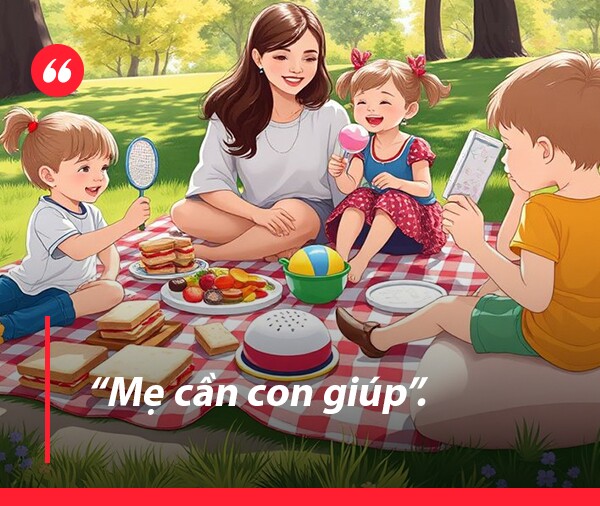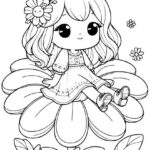The mess that Duoduo made on the table didn’t anger his mother. Instead, she smiled and said, “Wow, how did you come up with this? It looks delicious!” Duoduo was delighted to hear his mother’s praise.
In fact, in daily life, parents should not only provide for their children’s material needs but also pay attention to their spiritual development and stimulate their inner motivation.
To that end, daily conversations are essential. There are three phrases that mothers should frequently say to their children to boost their self-belief, confidence, and determination during their journey to adulthood.


“Mom needs your help”
Requests are the key to awakening responsibility.
“Can you help me hold the ladder?” “Can you help me pick the vegetables?” Compared to dry commands, these requests are like a stream that “wets the soul,” allowing children to feel their worth.
Neuroscientific research shows that when children recognize their self-worth, their prefrontal cortex releases more dopamine, the happiness neurotransmitter. This enhances memory circuits and builds neural networks for responsible thinking.
Like a gardener tending to seedlings, true growth comes not from pruning but from providing nourishment through sunshine and rain.
When it stems from inner alignment, it can foster longer-lasting growth than external rewards and punishments.
So, let these requests become a bridge, helping children accomplish tasks, discover themselves, develop fine qualities, and build deep connections with their families.


“That’s a brilliant idea! How did you come up with it?”
Curiosity is the spark that ignites intelligence and awakens the thirst for exploration in every child. Thus, parents should also value creative ideas and encourage them when appropriate.
Psychologists have found that descriptive praise can increase the activity of mirror neurons in children’s brains by 40%. This neural resonance is not just a physiological response but also a motivator for children to continue venturing into the unknown.
Each time children feel acknowledged by their parents, they gain more confidence to explore, much like archaeologists discovering precious artifacts from the past.

In reality, what sparkles in a child’s eyes is not just pride but also the joy of being seen. When asked, “Where did this brilliant idea come from?” we are, in fact, building load-bearing walls for their cognitive palace. This stimulates creativity, shows genuine interest, and creates a safe space for them to freely share and develop their ideas.
Imagine each positive feedback as a brick, building a solid foundation for their confidence and creativity. When children feel valued and encouraged, they dare to dream big, pursue their aspirations, and embrace failure.

“It’s okay to make mistakes; what will you do next time?”
Mistakes are the secret path to growth.
When a child accidentally spills milk, a simple instruction like “Let’s compose a song about Milkcastle” is better than ten reminders to “Be careful”.
The phrase, “It’s okay to make mistakes; what will you do next time?” conveys two messages:
– First, it’s normal for children to make mistakes, so they shouldn’t blame themselves too much.
– Second, it guides children to think about how to avoid similar mistakes and grow from their failures.

Developmental psychology confirms that children with growth mindsets show higher prefrontal cortex activity when facing setbacks, indicating stronger problem-solving abilities.
A low test score is not something to be ashamed of. The ultimate goal is for children to proactively say, “Maybe I should do this next time.” This calmness stems from countless accepted trial-and-error experiences. Unsuccessful adventures can become pathways to future success.
The art of education lies in these seemingly ordinary conversations, waiting for the moment to shine a light on their childhood.
A mother’s nurturing significantly influences a child’s cognition, behavior, and character. Thus, in daily life, mothers should use positive language to guide their children and stimulate their inner motivation. This healthy nurturing will help children build solid faith in their abilities.
Presenting Your Little One with 20 Floral Coloring Adventures: Unveiling a World of Colors and Creative Exploration
Introducing a vibrant world of colors and flora to your child, engage them in a conversation about the wonderful world of flowers. Spark their curiosity by asking questions about the names, hues, and symbolism of these delicate blooms. Encourage your little one to explore and appreciate the beauty and diversity of nature, fostering a deeper connection with the environment around them.





































